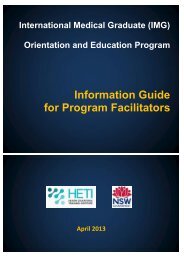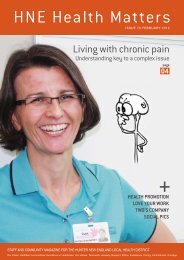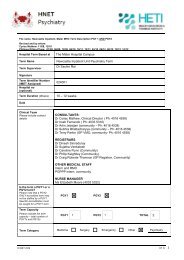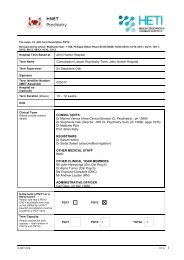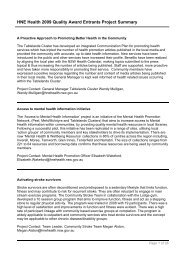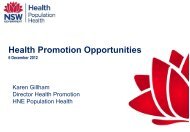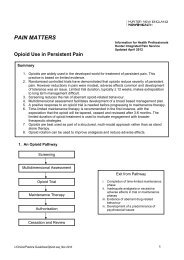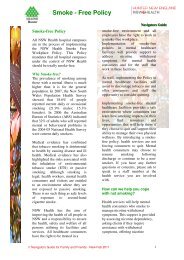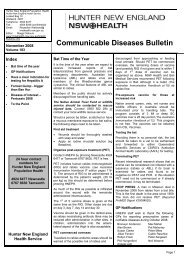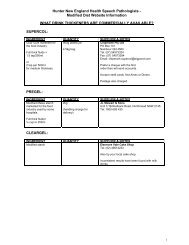March 2013 - Hunter New England Health - NSW Government
March 2013 - Hunter New England Health - NSW Government
March 2013 - Hunter New England Health - NSW Government
Create successful ePaper yourself
Turn your PDF publications into a flip-book with our unique Google optimized e-Paper software.
From Ireland to Moree, with no regrets<br />
Attracting health professionals to work in rural and remote areas is<br />
rarely an easy undertaking, particularly if they are overseas-trained.In<br />
fact, the process is notoriously challenging. Recruiters need to navigate<br />
the red tape associated with visas, sponsorship and qualifications. They<br />
also need to ‘sell’ the unique lifestyle that comes with country centres.<br />
But for the team at Moree Community <strong>Health</strong>, a recent overseas-trained<br />
nursing placement has proven refreshingly straightforward. And the<br />
keys to success have been a simple networking partnership, combined<br />
with some old-fashioned country hospitality.<br />
Margaret Hayes travelled more than 15,000 kms to take up her position<br />
as a Child and Family <strong>Health</strong> Nurse at Moree, and says she has had no<br />
regrets since arriving in Australia in November last year.<br />
“Moving your family to another continent is not an easy decision – in<br />
fact, many people warned us off the idea," Margaret said.<br />
"But we have felt really supported and encouraged every step of the way."<br />
Along with her husband Eamonn and two boys Timmy (15) and Jacob<br />
(8), Margaret has found life in Moree "wonderful", with the welcome<br />
received from locals described as "warm in every way".<br />
“My advice to others considering working in a rural area is to keep<br />
an open mind, and try not to have any preconceived ideas," said<br />
Margaret.<br />
"It will be different to what you might be used to, but if you take people<br />
and situations as they come, there are many, many benefits to living in<br />
the country".<br />
For Margaret, the professional transition from Northern Ireland to<br />
Moree has been smooth. She had spent the past 12 years working<br />
within regional communities as a <strong>Health</strong> Visitor, the UK-equivalent of a<br />
Child and Family <strong>Health</strong> Nurse.<br />
The transition was certainly made easier, however, thanks to the<br />
practical backing she received from HNE <strong>Health</strong> and the Rural<br />
Doctor’s Network (RDN).<br />
Moree Community <strong>Health</strong>’s Anne Lemmon worked closely with Emer<br />
O’Callaghan from the RDN’s Rural <strong>Health</strong> Professionals Program to<br />
secure Margaret’s placement, after recruitment for the child and family<br />
health position had proven unsuccessful for more than six months.<br />
"If it wasn’t for Emer and the Rural <strong>Health</strong> Professionals Program team,<br />
we would never have found Margaret, and she might not have found us,”<br />
Anne explained.<br />
The Hayes family with Anne Lemmon (right)<br />
“Emer guided us throughout, from initially putting us in contact with<br />
Margaret, then during the interview, vetting and appointment processes.<br />
She helped us arrange the relevant Australian training Margaret was<br />
required to complete before she could officially be appointed.<br />
“Although she’s based in <strong>New</strong>castle and I’m in Moree, Emer and I<br />
were able to establish an excellent working relationship via phone<br />
and email. She really has been a joy to work with and is an excellent<br />
communicator, and the end result is a staffing appointment that we are<br />
extremely happy with.”<br />
Anne also went above and beyond the call of duty in an effort to make<br />
Margaret and her family feel at home. She inspected rental properties<br />
on Margaret’s behalf and emailed her the relevant photos, collected<br />
Margaret and her family from the train when they arrived in Moree, and<br />
arranged a welcome barbecue at her own home. A gift basket was also<br />
arranged via Tourism Moree, which featured local food and information<br />
about the region and events.<br />
It really has been an invaluable experience in how to attract overseastrained<br />
staff to a regional community,” Anne said.<br />
“Working with Emer and the team has given me the confidence to<br />
pursue other overseas applicants and consider sponsorship, and to<br />
think outside the square when it comes to recruitment.”<br />
Tamworth redevelopment to benefit mums and bubs<br />
Mums and their babies from across the <strong>New</strong><br />
<strong>England</strong> North West will soon be cared for in<br />
one of the newest maternity units in the state.<br />
Next year construction will begin on the new<br />
Tamworth Hospital building, which will include<br />
the new maternity unit, birthing suites and<br />
special care nursery.<br />
"The brand new maternity unit, featuring 10<br />
single rooms with private ensuites, will give<br />
mums more privacy before and after they give<br />
birth,” said Tamworth Hospital Maternity Unit,<br />
Nurse Unit Manager Maureen Dawson.<br />
“Having private ensuites in each room will<br />
mean mums can stay in their room to use the<br />
bathroom rather than making the sometimes<br />
tiring walk to the shared bathroom at the end<br />
of the corridor.”<br />
An extra delivery room will be included in the<br />
new birthing unit, taking the capacity from<br />
three to four birthing rooms complete with<br />
island baths.<br />
“We have one older, shared bath in our current<br />
unit, so it’s excellent that all women will have<br />
access to a bath right in their delivery suite,”<br />
says Mrs Dawson.<br />
The new special care nursery will include 12 places<br />
compared to the six cots currently available.<br />
In time, and with more planning, the special<br />
care nursery will care for babies born at 32<br />
weeks. Right now all babies born under 34<br />
weeks are transferred to a more specialised<br />
hospital for care.<br />
“The change will mean we can care for<br />
children who have more serious conditions<br />
such as respiratory distress, and fewer<br />
families will have to follow their baby to a<br />
larger centre,” Mrs Dawson said.<br />
hnehealth.nsw.gov.au 3



